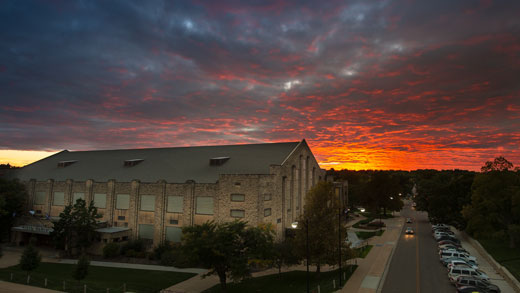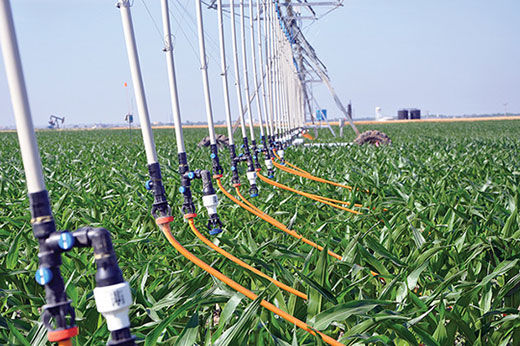05/09/18
K-State Current - May 9, 2018
K-State Current is a weekly news update for the Kansas Board of Regents to apprise the Regents on a few of the many successes and achievements made by K-State faculty, staff and students.

K-State News
Success by degree: Nearly 3,400 graduating from Kansas State University

It's graduation time at Kansas State University with commencement ceremonies Saturday, May 5, at Kansas State University Polytechnic Campus in Salina and Friday, May 11, and Saturday, May 12, on the main campus in Manhattan.
Nearly 3,400 students are candidates for graduation. To be awarded will be more than 2,700 bachelor's, nearly 660 master's, about 90 doctorates, 106 Doctor of Veterinary Medicine and three associate degrees. Several students will be multiple degree recipients. More than 330 students are earning degrees through K-State Global Campus distance programs.
The 2018 graduates are part of the 151st class to graduate from Kansas State University.
This year's commencement speakers include the university's president and first lady, the outgoing provost, retired executives from Cargill and Union Pacific, a distinguished architect and the president of the Georgia Institute of Technology, who is a Kansas State University alumnus.
A live webcast of the ceremonies will be available at k-state.edu/graduation/. A virtual commencement ceremony for distance students is available at dce.k-state.edu/students/commencement/.
Ceremonies start at 10 a.m. May 5 with commencement for Kansas State Polytechnic in the campus's Student Life Center. Commencement speaker will be Mary Jo Myers, Kansas State University's first lady. Myers has a long background in public service involving military, educational and humanitarian organizations.
Graduate degrees will be awarded May 11 on the Manhattan campus. The Graduate School ceremony will be at 1 p.m. in Bramlage Coliseum. G.P. "Bud" Peterson, the president of Georgia Tech and a Kansas State University alumnus, will receive an honorary doctorate — the highest honor the university gives — at the ceremony and serve as commencement speaker.
Kansas Board of Regents member Dennis Mullin, Manhattan, will represent the board at commencement for the Graduate School and at the College of Veterinary Medicine ceremony, which will be at 3:30 p.m. May 12 in McCain Auditorium. The college's speaker will be Michael Apley, who holds the Edwin J. Frick professorship in veterinary medicine at the college. Apley earned his Doctor of Veterinary Medicine from Kansas State University.
On May 12, undergraduate colleges on the Manhattan campus will award degrees, and the College of Architecture, Planning and Design, whose graduates participate in the Graduate School ceremony, will have a recognition ceremony. The following is the schedule of ceremonies and speakers:
- College of Arts and Sciences, 8:30 a.m., Bramlage Coliseum, with Jim Haymaker, retired corporate vice president of strategy and development at Cargill, as speaker. Haymaker earned bachelor's degrees in economics and French from Kansas State University.
- College of Architecture, Planning & Design, 10 a.m., in McCain Auditorium, with Cheryl McAfee, CEO of McAfee3 Architects, Atlanta, as speaker. McAfee earned her bachelor's degree in architecture from Kansas State University.
- College of Education, 11 a.m., Bramlage Coliseum, with David Griffin Sr., assistant dean of the College of Education, director of the college's Center for Student Services and Professional Services, and an associate professor of curriculum and instruction, as speaker. Griffin is retiring in June following 26 years with the college. He is a Kansas State University alumnus, earning his doctorate in educational administration and leadership.
- College of Business Administration, 12:30 p.m., Bramlage Coliseum, with Candace Duncan, retired managing partner of KPMG in Washington, D.C., as speaker. Duncan earned a bachelor's degree in accounting from Kansas State University.
- College of Agriculture, 2:30 p.m., Bramlage Coliseum, with Richard Myers, Kansas State University president, as speaker. Myers is a retired U.S. Air Force four-star general and former chairman of the Joint Chiefs of Staff who became the university's 14th president in 2016. A Kansas State University alumnus, he earned a bachelor's degree in mechanical engineering and was a member of the Air Force ROTC program.
- College of Human Ecology, 4:30 p.m., Bramlage Coliseum, with April Mason, the university's provost and senior vice president. Mason is leaving Kansas State University after serving in her current position for eight years.
- College of Engineering, 6:30 p.m., Bramlage Coliseum, with Ivor "Ike Evans, retired president and chief operating officer of Union Pacific Railroad, as speaker. Evans earned a bachelor's degree in electrical engineering from Kansas State University.
Commissioning ceremonies for the university's graduating Air Force and Army ROTC cadets will both be May 11 in the K-State Student Union. The Air Force ROTC ceremony will be at 8 a.m. in Forum Hall, while the Army ROTC ceremony will be at 10 a.m. in the Main Ballroom.
K-State part of $5 million grant to address water scarcity
Kansas State University is part of a $5 million grant from the Foundation for Food and Agriculture Research (FFAR) to launch the Irrigation Innovation Consortium, a collaborative research effort to accelerate the development and adoption of efficient irrigation technologies and practices through public-private partnerships.
K-State, in partnership with four other universities and several industry partners, will match the FFAR grant money for a total initial investment of $10 million to support irrigation technology research and collaboration costs over five years.
Membership in the consortium presents a unique opportunity for K-State, according to Dan Devlin, director of the Kansas Center for Agricultural Resources and the Environment (KCARE).
“The exciting thing about being part of this group is the opportunity to partner with other universities as a team,” Devlin said.
Devlin also noted that the grant will create possibilities for K-State researchers to work closely with industry members to help get their research innovations into the field even faster.
Consortium funds will enable public sector researchers and industry partners to co-develop, test, and improve cutting-edge innovations, equipment, technology, and decision and information systems designed to equip and enhance “farms of the future,” according to a news release from FFAR.
Initial research priorities include water and energy efficiency, remote sensing and big data applications for improving water management, irrigation technology acceleration, and technology transfer. An executive committee, with representation from FFAR and academic and industry consortium participants, will determine specific research priorities.
Universities joining K-State in the consortium include California State University, Fresno; Colorado State University; Texas A&M Agrilife Research; and the Robert B. Daugherty Water for Food Global Institute at the University of Nebraska, Lincoln.
Industry members include Jain Irrigation, Lindsay Corporation and Rubicon Water. Other members are the Irrigation Association (IA), a national membership organization that represents companies and professionals from across the country, and the Northern Colorado Conservation District.
“The new Irrigation Innovation Consortium unites top university research talent with industry to promote practical advancements in irrigation technology and water management practices,” said Sally Rockey, executive director of the Foundation for Food and Agriculture Research. “We are optimistic that outcomes from this collaborative effort will help producers grow more food with smart water management and strengthen the resilience of our food supply."
Initial participants are working to create an expanded platform for other universities, federal agencies, and the private sector to work together on the critical water challenges facing agriculture, municipalities, and industry. The goal is to create an internationally recognized, self-sustaining center of excellence that promotes and enhances water and energy efficiency in irrigation, ultimately creating greater resiliency in food and irrigated landscape systems.
“The [Irrigation Association] thanks FFAR and the university partners for their leadership in the creation of the new Irrigation Innovation Consortium,” said IA’s CEO Deborah M. Hamlin. “We are confident that the research stemming from this collaborative effort will drive new advancements in efficient irrigation and keep the irrigation industry at the forefront of innovation.”
Knowledge gained through the consortium will be made available through publications, workshops and seminars, and appropriate data-sharing mechanisms.
Plans for the consortium began at a FFAR-hosted convening event held at the University of Nebraska’s Daugherty Water for Food Institute Conference in Lincoln. Approximately 25 representatives of private companies participated in the discussion, which helped shape the initial research focus of the Consortium.
Organizations interested in joining the Irrigation Innovation Consortium are invited to contact Stephen Smith, executive director of the Irrigation Innovation Consortium and FFAR advisory council member: swsmith@buenavidafarm.com.
The Irrigation Innovation Consortium was formally launched April 27 at the Water in the West Symposium hosted by Colorado State University.
K-State Faculty Highlights
Three Kansas State University researchers awarded more than $415,000 to study microbiomes
Kansas State University researchers Dong Lin, Colby Moorberg and Prathap Parameswaran have received three of five grants awarded to researchers at Kansas institutions to study water, plant and soil microbiomes.
The grants were made by the large, statewide Kansas award from the National Science Foundation Established Program to Stimulate Competitive Research, or NSF EPSCoR, which aims to build research and development capacity. The theme of the statewide project is Microbiomes of Aquatic, Plant and Soil Systems, or MAPS. The $20 million project seeks to use genomic analysis to enhance agricultural productivity and mitigate environmental problems.
Lin, assistant professor of industrial and manufacturing systems engineering, will receive $137,630 to use 3D printing to develop novel cellular structures from cellulose, the main component of plant cell walls and fibers. Lin's goal is to produce an artificial wood-like material and test how well it mimics the microstructure of wood inside trees by inoculating with bacteria to determine if they are able to colonize the matrix as they would in natural wood.
Moorberg, assistant professor of agronomy, will receive $141,885 to study the soil in the vicinity of plant roots known as the rhizosphere. Soil and microorganisms in the rhizosphere are influenced by plants and their stresses, but instruments that measure the changes and capture data are expensive and labor-intensive to use. Moorberg will work to develop an inexpensive camera system and components to automate image capture and analysis to examine the effects of periods of intense drought followed by periods of intense rainfall — known as weather whiplash — on root growth.
Parameswaran, assistant professor of civil engineering, will receive $136,908 to test his hypothesis that wastewater-enriched microbial communities in land-applied nutrient products from an anaerobic membrane bioreactor will help regulate nitrogen and phosphorus release rates in topsoil. Parameswaran has already demonstrated successful operation of a pilot-scale anaerobic membrane bioreactor that treats around 1,000 gallons of wastewater per day at Fort Riley.
The grants were awarded by the Kansas NSF EPSCoR First Award program. According to Beth Montelone, Kansas State University senior associate vice president for research, the program is an important workforce development effort.
"These grants go to early career faculty to help in the start of their independent academic careers," Montelone said. "They are awarded based on a statewide competition in which faculty submit NSF-style proposals that are selected on the basis of out-of-state reviews and discussion among the research officers of the participating Kansas institutions."
Read more about Kansas NSF EPSCoR First Award recipients or read more about Kansas State University's involvement in MAPS.
K-State Student News
Students in business course provide diversity and inclusion consulting to two companies
This semester, Kansas State University students enrolled in Management of Diversity in the Workplace, MANGT 560, had the unique experiential learning opportunity of working in teams to provide consulting for Hormel Foods and PROS.
Both companies sought recommendations to further improve their diversity and inclusion strategies, and the partnership provided students in the course a real-world experience in creating strategies to address diversity and inclusion challenges commonly faced in the workplace. Students analyzed the challenge, developed recommendations and proposed a realistic implementation plan.
"The opportunity Hormel Foods and PROS have provided the students is extremely valuable," said Olivia Law-DelRosso, instructor for the course. "Partnership with businesses gives students the experience they need to apply theory and develop skills they will need after graduation."
Four teams of student consultants provided recommendations for each company, with the winning team as assessed by each company receiving prizes.
The winning team for Hormel Foods included David Brooks, senior in management, Chapman; Regan Aylward, senior in management, Manhattan; Kayla McDougald, senior in management, Olpe Rebecca Bishop, senior in management, Overland Park; and Timothy Lillis, senior in management, St. Marys.
"We were so impressed by the hard work and recommendations of the students," said Jennifer Dao, supervisor of recruitment at Hormel Foods. "Hormel Foods believes that all employees should come to work feeling valued for their different backgrounds and experiences. Being able to partner with K-State is another way for us to build upon our already strong partnership, and the students provided us with great insights as to how we can continue to be an even more diverse and inclusive company for new and current employees."
The winning team for PROS included Justin Horner, junior in management, El Dorado; Shawn Massey, senior in management, and Hank Raines, senior in management, both from Manhattan; Griffin Case, senior in management, Marion; and Brice Buehler, senior in management, Olathe.
"The students at K-State were highly engaged and brought great ideas to the table," said Matt McClung, PROS Inc. director of customer success for the Americas, Australia and New Zealand. "All the teams provided deep-thought leadership with ideas we can use in our organization as we continue to evolve the diversity of our leadership teams. It was clear that Olivia Law-Delrosso prepared her teams well and provided them with great leadership in the process."
"Leading companies today see diversity and inclusion as a necessary strategy to be integrated into every aspect of the workplace and included in the strategic goals of the organization," said Dawne Martin, assistant dean for diversity. "The College of Business Administration seeks to prepare students to not only understand how critical diversity and inclusion is, but to be able to create strategic and lasting change to make the workplace better for everyone."